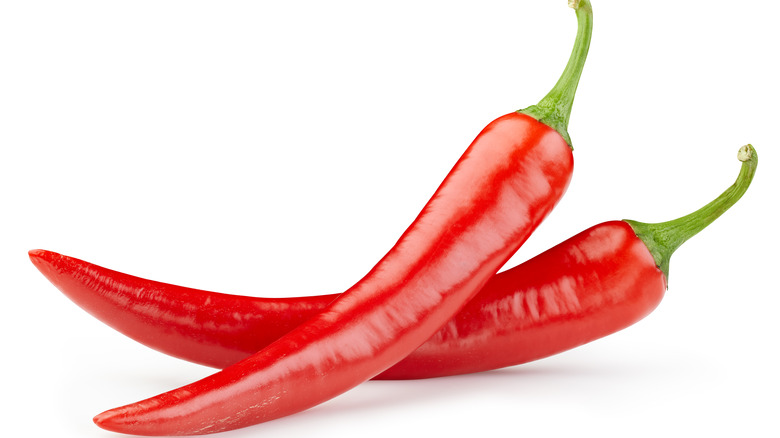Study Reveals What Happens To Your Body When You Eat Spicy Foods
For those who love the kick of a hot pepper, its benefits can be traced to one core ingredient. Capsaicin is the chemical that gives hot peppers their heat and sting (via HealthDay). It has been used in pepper sprays, pest repellents, and various pain relief medications, according to research published by the American Chemical Society, per Science Daily. No doubt capsaicin can be used in a number of ways, but how does this versatile chemical affect the body?
Experts from the University Hospitals Cleveland Medical Center reveal a new study in which researchers were able to get a better understanding of the physiological response behind the burning sensation of a hot pepper (per HealthDay). "Capsaicin does not actually burn you," explains University Hospitals dietician, Jayna Metalonis. "Instead, it tricks your brain into thinking a temperature change has occurred, resulting in the sensation of heat and pain."
Interestingly, the research showed that in response to this perceived temperature change, the body does in fact increase its core temperature when eating spicy foods as a means to cool down. If this sounds backwards, consider how the body responds to a fever in order to fight against infection when we're sick. As your temperature rises, you may start to sweat and then cool down once the fever breaks (via Verywell Health).
How spicy foods may benefit your health in the long run
While the short-term effects of spicy food on the body are certainly intriguing, the long-term effects look to be even more fascinating. Metalonis says studies have revealed people who consume spicy food six times a week may be at a lower risk for premature death compared to individuals who rarely consume spicy foods week to week, per HealthDay. Some possible reasons are that spicy food has been linked to improved gut and stomach health, weight loss, lower cholesterol levels, and more.
Previous studies have also shown that capsaicin may benefit some of our most vital organs. Science Daily highlights research via the American Chemical Society (ACS) that revealed how capsaicin may help prevent cholesterol buildup by more effectively breaking it down into waste and by boosting blood flow through the blood vessels. Not only that, but findings from a 2015 animal study presented by the European Association for the Study of the Liver showed that consuming capsaicin every day may help improve liver damage and slow disease progression (via Science Daily).
While eating extremely spicy foods is not thought to pose a significant risk to our health, Metalonis explained in a public statement that they are best consumed in moderation (per HealthDay). As capsaicin is digested, it can cause symptoms such as hiccups, throat swelling, nausea, vomiting, or diarrhea.


